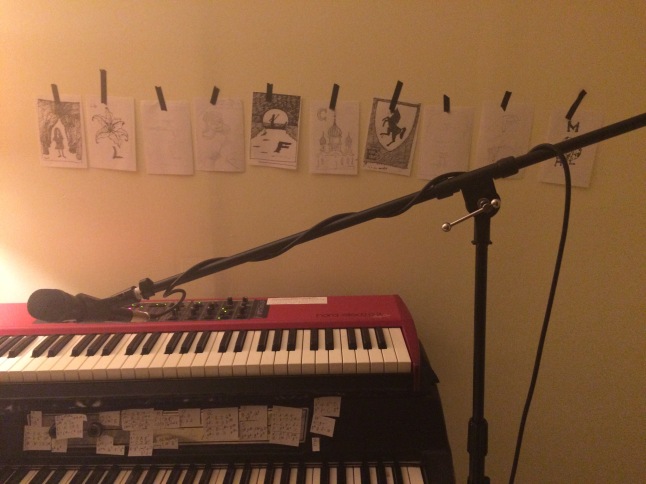play
Notes scribbled during a performance of Cineastas, expanded upon and turned into ten rules to live by
1.Two lives are more balanced than one. A double life is preferred, and keeps people guessing.
2. Objects reconstruct life. Look around a space, how everything is placed tells our story.
3. The juxtaposition of two things paves the way for a third idea. The superimposition of fiction upon a life creates a hybrid existence, clarified, rare, potentially immortal.
4. Everything that belongs to us will someday be part of someone else’s film set. Take as a case in point, adultery. A husband or a wife is as apt to show up in someone else’s drama as an ascot or a handbag.
5. There’s little time left.
6. “To Moscow we must go!” Ever since Chekhov wrote Three Sisters, this expression has exemplified a longing for poetry and art and culture and a desire to escape the low-brow and the mundane. In Cineastas, the character goes on to ask, “What will I do once I get there?”
7. We see fictions. We see our lives through fictional lenses. Does art imitate life or is it vice versa?
8. In all stories, the inciting incident is what sets a character off upon a transformative journey. In Cineastas, the filmmaker starts out to make his or her film. It is the inciting incident which interrupts, transforming the experience of making the film into a harrowing, mind-boggling, revelatory act, which is the play within the play we take delight in.
9. What changes? What lasts? How does the concept of erasure force us to see the things in life that are valuable and therefore fleeting? Or, is it the other way around: is our ghost life valuable because it is a slate soon to be wiped clean?
10. Fiction lasts longer than lives. Identity is fluid. We can identify with the Russian Steppes, we may perceive those hills containing measurable qualities that will sustain us. In the end, what we have to live on is story-telling and imagination.
Yes, Cindy; emotions have bristles (explained by neurobiology)
Today I read a great Antonio Damasio interview in which he distinguishes between emotions and feelings, the first coming out of sensation and giving birth to the latter.
“There are certain action programs that are obviously permanently installed in our organs and in our brains so that we can survive, flourish, procreate, and, eventually, die. This is the world of life regulation—homeostasis.”
I’ve always wondered why emotional events play such havoc on our basic functions – sleep, metabolism – and how a loss or betrayal can usher in a fight or flight response.
“We must separate the component that comes out of actions (emotion) from the component that comes out of our perspective on those actions, which is feeling. Curiously, it’s also where the self emerges, and consciousness itself.”
I stumbled upon a playful rendering of this concept today in Maria Irene Fornes’ play, Fefu and her friends.
Cindy: When a person is swept off their feet. . . the feet remain and the person goes off. . . with the broom?
Christina: No. . . when a person is swept off their feet. . . there is no broom.
Cindy: What does the sweeping?
Christina: An emotion. . . a feeling. . .
Cindy: Then emotions have bristles?
Christina: Yes.
Spotlight: Sarah Ruhl’s 100 essays I don’t have time to write
I’m up before dawn, on a Sunday! The milk for my tea is hovering just this side of sour & it’s starting to clot before my bleary eyes. Nonetheless, I have to run to my desk, now, to write a review of Sarah Ruhl’s 100 essays I don’t have time to write on umbrellas and sword fights, parades and dogs, fire alarms, children and theater. Because I love this book! It contains so much that is of value! Sarah Ruhl reminds us that art comes from life – messy, imperfect life- and that we humans screw things up with our uber-seriousness. “Where are the jugglers? The fire-eaters?” she asks. Refusing to idealize or disparage motherhood, she aligns it with the primary urge to make theater, and claims that both require the DIY ability of turning junk into treasure.
Sarah Ruhl packs so much hilarity and profundity in her prose. In essay #35, just 25 words in to it she has restored our creative potential; stating what comes naturally to 5 year olds, and Shakespeare – “By speaking it [a palace, the woods, an evil tower], we make it so.”
Notwithstanding her playful tone, Sarah Ruhl touches upon various isms.
Sexism – “A male artist following his whims is daring, manly, and original. A woman artist following her whims is womanly, capricious, and trivial.” #61
Racism – “Color-blind casting; or, why are there so many white people on stage?” #41
Elitism – “Do we all need a master’s degree to put up a play? Whatever happened to the garage, to the basement?” #38
Ageism – “Botox has become our new version of the Greek mask.” #29
Celebrity worship – “Everyone is famous in a parade.” #36
Technology fixation – “If waiting is lost, then will all the unconscious processes that take place during waiting get lost? And then might we see the death of the unconscious, and the death of culture?” #72
Her nuggets are the sort of pearls one scribbles on the back of a napkin (or, in my case, index cards); not precious, scooped from the chaos of life. For me, the message I treasure is to plunge more madly into the mess. “More failure! More demand for failure! More bad plays! Less perfection! More ugliness! More grace!” she belts in essay #56, as if she is competing with a jackhammer and a wired toddler (or both).
I still have 22 essays to go in the book, but I had to pen this review without delay! It couldn’t wait! I want to savor the remaining essays, and, besides, when I do finish, I’ll probably start it over at the beginning.
A conversation about vocal technique in which a 14 year old choir boy takes on his mother’s idols
Having played for her son Bird on a Wire and The Sailing Song by Leonard Cohen and Nick Cave respectively.
Margo: How low are they singing?
Kepler: It’s not that they are singing low, it’s just that they aren’t good singers so they use mixed voice which gives them a nice tone. It’s hard to say if they are a tenor or a baritone b/c they’re just singing where their voices sound good. I’m sure if they wanted to get trained they could and we could find out what their range is but they don’t want to b/c they are singing in a place that is easy to find a good tone in.
Margo: Leonard Cohen is quite old, you know.
Kepler: Yeah, your voice will never tire in mixed voice. Since they aren’t really singing in any range they are able to get that super easy tone and not strain themselves. They can sing that way on their deathbed, since that range where they’re comfortable is never going to change.
Margo: I’m sure they’d be relieved to know that.
Kepler: They don’t have to worry b/c they sound as good as any singer in that voice tone, and they probably sing their songs better than anyone else anyways. As far as pitch goes, in their kind of songs, pitch doesn’t really matter.
Margo: I never thought of that before.
The Man Who Can Forget Anything, a response to a performance by the same name
Preface
I do not trust my mind to remember anything. Thus I incessantly scribble ideas down on whatever I have on hand. A passport. A handbill. A ticket stub even.
Lofty beginnings
They took a very small boy and put him on top of a high high ladder in the old Eagles Auditorium. That was my son. And he sung a song from up there. It was a very long time ago so I can’t remember exactly what song it was, although it was a song from the musical Suessical.
A brush with the divine
I was trying on a dress in the vintage shop Mike’s Old Clothes, in a version of Seattle no one remembers anymore. The dress had a peculiar sash which I found myself frankly at odds with. I emerged from the dressing room with the two ends akimbo. A man leapt out from the shadows and tied it with a flourish. I recognized him as the dancer Mark Morris. I was too timid to tell him it was I!-the girl-child he had dedicated his solo Jealousy to at Bagley Wright some 5 years earlier. I was aware of the irony of needing more time to pull myself together when it was my inchoate state he had found so refreshing in the first place.
Diminutive yet stong men
I saw Mikhail Baryshnikov not in Moscow but here, on this very stage, dancing to Ivor Cutler. From the front row where I gratefully sat, having procured a ticket from a stranger, he appeared quite small in stature though wonderfully expressive. His face above all was a superbly malleable instrument which crowned his divine proportions.
Waistcoat and angel wings
Outside of Seattle’s new opera house, I shot Kepler and Charlie in a candid pose before a performance of the ballet A Midsummer’s Night Dream. The balancing act, with children, is not being too strident in passing on one’s own predilections or occupations. Thus, the pitter patter of my heart when my son choose the donning of a costume free of my suggestion.
Snowman
The dancers filing out of Cornish gathered around to watch my boy-child nimbly mold a snowman. The way their giggles rushed out of them, only to be squelched by the frosty air, reminded me that though young, they had little knowledge of, or time for, the pursuits of childhood.
Nothing but regrets dept.
I am remorseful that I failed to see the production of Three Sisters when it came recently despite reading glowing reviews. I am contrite.
More of the same
I would also like to express regret for failing to see Ezra’s site specific dance piece exploring mental health and mother – son relations. I sensed the value of his work with every pore and yet failed to get my sorry ass to the street where it unfolded. I am ashamed and unabashedly penitent.
In case anything should happen. . . . .
We ought to have the manuals for every obsolete technology we’ve ever used to articulate our ideas uploaded into a chip and inserted into our skull cavity, to be removed upon our demise.
Memory palace
One day my son came home and said that they had learned something extraordinary at school. They had been taught they could remember anything if they hid it away in a crevice born of imagination.
The Entr’acte
Silence. Foot steps. A scuffle. The world is created sound bite by bite, each stab or slap or stomp or shuffle or shove another layer of scaffolding, the culmination of which is the tinkling of a grand piano and a man in a hat saying enjoy the show.
Time passing
The train is pulling into the station. My son boards the train. From the viewing platform I see him moving about the dining car where as a minor he is required to exist. I am a voyeur, drinking in his autonomous form as it readies itself for the exhilaration of travel. I am also gazing into a time capsule, reliving my own rail adventures from my stationary post. “All aboard!” the lady cries deafeningly as time rattles on for us both.
My heart is like an expensive piano
Two words overlapping inscribe something new. Two distinct time frames interposed jolt the audience into accepting the murkiness of the time-space continuum. Sitting in Room #608 and watching the high jinxes of silent film unfold as the clatter of feet – at first faint – grows in volume until, at last! the characters from the film are made flesh and burst into the room with the audacity of time bandits!
Concluding comments by two Vladimirs
“Memory is repetition.” Those words were spoken by my character Vladimir in A Warehouse Dream. Beckett’s Vladimir said, “Habit is a great deadener.”
Disclaimer
I apologize for having seemingly used the space here to write about my life, instead of reporting on the show as expected. In some sense, the performance was a blank canvas which I utilized for my own memories, some of which had much to do with the show, while others had less.
Epilogue
My son and I traveled the long route up Denny (unhampered by snow). Our fellow bus passengers (including a man carrying a dustpan and a pickaxe with bike locks hanging from his pockets) enhanced our understanding of our fellow man while the revolving floor tested my sense of gravity. We arrived home safe, greeted by the smell of apples, with the work through the night before us.
The domestic queen shares the stage with the destructive lady
When he left me, I was devastated; from the perspective of my domestic queen the question loomed: how could he reject such a paradigm of household perfection?
But the destructive lady thought differently. She saw how deftly I handled adversity. She noticed how a part of me leaped with the packing up of boxes, the purging of cookware. She saw how devastation made room for new growth.
And I, in turn, was indebted to her for keeping life vital and exciting.
Now I am pulled towards familiar comforts. Destructive lady says, hang on, don’t forget me, I am the key to so much – creativity, sexuality, as well as chaos and demolition. Don’t neglect my role in your life, or else!
The idea comes. How about letting the destructive lady pick something substantial to pursue? And if she is occupied with something powerful she can really sink her teeth into maybe just maybe lady #1 can go about her needed business without so much drama and fanfare.
Marriage 101
“We’re all fucked up because in English the phrase ‘to make someone happy’ suggests that’s possible.” Rachel Zucker, The Pedestrians
“Our need for security versus our need for adventure, surprise. I think of it more as a paradox to manage than a problem to solve.” Ester Perel, TED talk
“Don’t touch me! Don’t question me! Don’t speak to me! Stay with me!” Samuel Beckett, Waiting for Godot

 the cards as props to play the game I’ve come up with for my tour. I see how the ritual I invented mirrors my process. The songs tell a story. The story goes from left to right, like a storyboard or a keyboard. And the songs reel in time to weave a tale which unfolds before the audience. Which is then summarized so that everyone can go home and have a good night’s sleep. The End
the cards as props to play the game I’ve come up with for my tour. I see how the ritual I invented mirrors my process. The songs tell a story. The story goes from left to right, like a storyboard or a keyboard. And the songs reel in time to weave a tale which unfolds before the audience. Which is then summarized so that everyone can go home and have a good night’s sleep. The End
